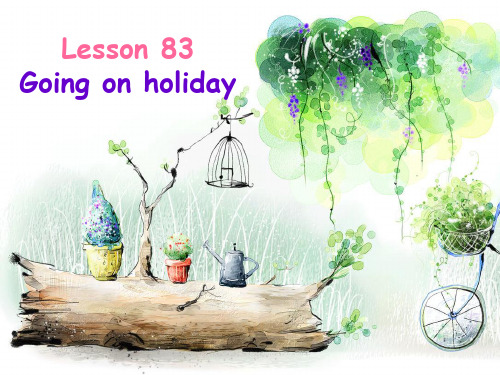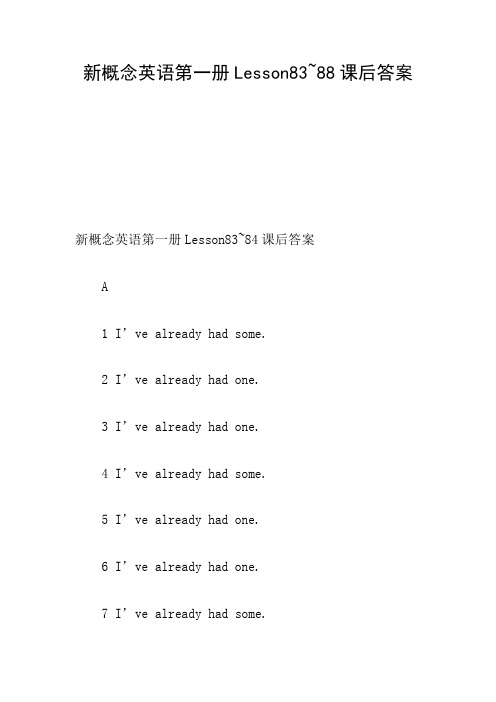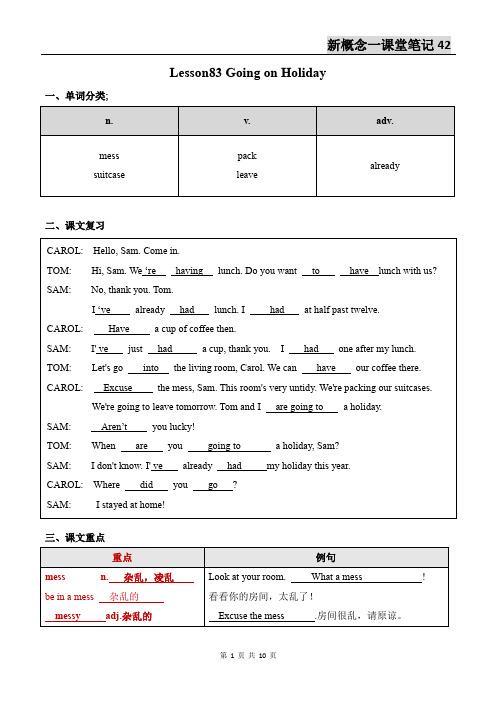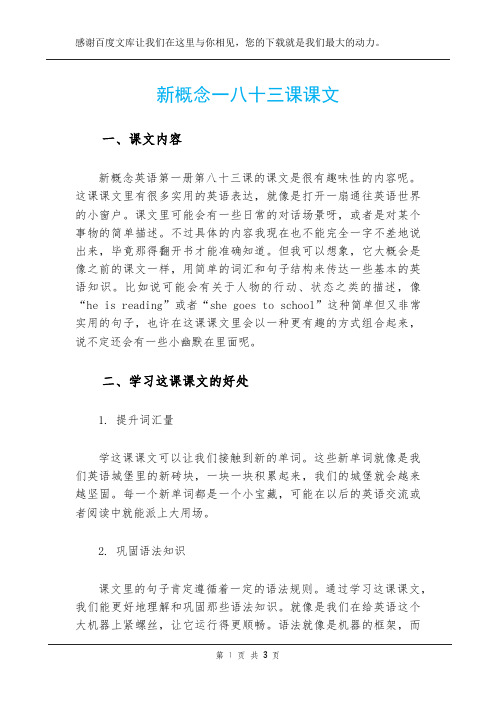新概念英语第一册课文翻译及学习笔记Lesson83
新概念第一册Lesson83-84第十一次

★ 现在完成时 (1)主要用于以下两种情况:或者表示在过去
不确定的时间里发生的并与现在有着某种联系的 动作;或者表示开始于过去并持续到现在的动作。
I've already had my holiday this year. 本课中萨姆所面临的是第1种情况,正是因为他吃 了饭,喝过了咖啡,也休过假,因此他谢绝了汤 姆的邀请,并表示今年已无可能再次休假。
词汇扩展: messy adj. 凌乱的,脏的
Your desk is always messy.
★ pack [pæ k] v.打包,装箱
unpack
(1) v. 打包,装箱
Don' t forget to pack the mirror! 别忘了把镜子装起来! We began to pack them into a suitcase. 我们现在开始把它们装到手提箱里。
➢ Have you / Has she had any vegetables or fruit? ---- I haven’t / She hasn’t had any vegetables.
I’ve / She’s just (already) had some fruit.
HOME WORK:
tw of coffee then.
SAM:I've just had a cup, thank you. I had one after my lunch.
TOM: Let's go into the living room, Carol.
We can have our coffee there.
新概念英语第一册Lesson83-84

4.have a holiday 度假
have在不同的词组中,意思不同。 如have lunch,吃午饭。Have a cup of coffee,喝杯咖啡。
5.stay at home 呆在家里
注意名词home之前不加任何冠词。在诸如go home, arrive home的短语中,hom跟过去时比较接近,注意区分。 2)过去时强调过去做了什么,现在完成时强调过去的不确定的时间开始,这个动作 到现在的动作的延续,这个动作可能结束,也可能继续下去。
如我学习英语两年了。I have learned English for two years. 我已经读过这本书了。I have read this book.
本课中Sam的3句话属于第一种情况,正是因为他吃了饭,喝过了咖啡,也休 过假,因此他谢绝了Tom的邀请,并表示今年已无可能再次休假。
现在完成时是由have的现在式加上过去分词组成。 规则动词的过去分词与过去式相同,而不规则动词的过去分词则无统 一的规律可言。
现在完成时
过去
将来
一般过去时: 发生在以前,跟现在没有关系。过去我做了什么,我是什么状态等等。 昨天我去了伦敦。I went to London yesterday. 两分钟前我去了楼下。I went upstairs two minutes ago.
现在完成时:表示的是过去一个不确定的时间里发出的一个动作或状态 延续到现在,对现在的影响或是结果,这个动作可能完成也可能延续。
2.I’ve already had lunch.
already 已经 注意already的语序。在一般情况下,它跟在助动词后面。
3.Excuse the mess
乱七八糟,请原谅。 e.g. The room is in a mess. 房间很乱。
新概念英语第一册Lesson83-88课后答案

新概念英语第一册Lesson83~88课后答案新概念英语第一册Lesson83~84课后答案A1 I’ve already had some.2 I’ve already had one.3 I’ve already had one.4 I’ve already had some.5 I’ve already had one.6 I’ve already had one.7 I’ve already had some.B1 He hasn’t had any beans. He’s just had some peas.2 They haven’t had any tea. They’ve just had some coffee.3 I haven’t had any apples. I’ve just had some peaches.4 I haven’t had any cabbage. I’ve just had some lettuce.5 She hasn’t had any beer. She’s just had some wine.6 He hasn’t had any lamb. He’s just had some beef.7 They haven’t had any tea. They’ve just had some milk.8 She hasn’t had any meat. She’s just had somevegetables.9 I haven’t had any chicken. I’ve just had some steak.10 They haven’t had any bananas. They’ve just had some oranges.新概念英语第一册Lesson85~86课后答案A1 She has just boiled an egg.2 She has never been to China, but he was there in 1992.3 He has already painted that bookcase.4 He has just dusted the cupboard.B1 I’ve already cleaned my shoes. I cleaned my shoeslast night.2 I’ve already opened the window. I opened the window an hour ago.3 I’ve already sharpened my pencil. I sharpened my pencil a minute ago.4 I’ve already turned on the television. I turned on the television ten minutes ago.5 I’ve already boiled the milk. I boiled the milk yesterday morning.6 I’ve already emptied the basket. I emptied the basket yesterday.7 I’ve already asked a question. I asked the question two minutes ago.8 I’ve already typed that letter. I typed that letter this morning.9 I’ve already washed my hands. I washed my handsfive minutes ago.10 I’ve already walked across the park. I walked across the park an hour ago.11 I’ve already painted that bookcase. I painted that bookcase a year ago.12 I’ve already dusted the cupboard. I dusted the cupboard this afternoon.新概念英语第一册Lesson87~88课后答案A1 Did he find his pen a minute ago? He didn’t find his pen a minute ago.2 Did he get a new television last week? He didn’t get a new television last week.3 Did you hear the news on the radio? We didn’t hear the news on the radio.4 Did they leave this morning? They didn’t leave this morning.5 Did he lose his umbrella yesterday? He didn’t lose his umbrella yesterday.6 Did you sweep the floor this morning? I didn’t sweep the floor this morning.B1 Has he met Mrs. Jones yet? Yes, he has already met Mrs. Jones.When did he meet Mrs. Jones? He met her two weeks ago.2 Has the boss left yet? Yes,the boss has already left.When did the boss leave? He left ten minutes ago.3 Has he had breakfast yet? Yes, he has already had breakfast.When did he have breakfast? He had breakfast at half past seven.4 Has she found her pen yet? Yes, she has already found her pen.When did she find her pen? She found her pen an hour ago.5 Has he got a television yet? Yes, he has already got a television.When did he get a television? He got a television two weeks ago.6 Has she heard the news yet? Yes, she has already heard the news.When did she hear the news? She heard the news yesterday.7 Has she made the bed yet? Yes, she has already made the bed.When did she make the bed? She made the bed this morning.8 Has he sent the letter yet? Yes, he has already sent the letter.When did he send the letter? He sent the letter the day before yesterday.9 Has she swept the floor yet? Yes, she has already swept the floor.When did she sweep the floor? She swept the floor yesterday morning.10 Has she told him the truth yet? Yes, she has already told him the truth.When did she tell him the truth? She told him the truth last night.。
新概念第一册第83课

27
ABA
有些动词的过去分词与原形是一样的:
run-ran-run come-came-come become-became-become
28
ABB(含规则动词)
原型 过去式 过去分词
例词
-eep -ept -ept
keep, sweep, sleep
-ell -old -old
tell
-d
-t
Yes, I have already done it. ➢Haven’t you done it yet?
No, I haven’t done it yet.
34
现在完成时VS一般过去时
35
➢ 我每天做作业。(一般现在) ➢ I do my homework every day. ➢ 我昨天做作业了。(一般过去) ➢ I did my homework yesterday. ➢ 我正在做作业。(现在进行) ➢ I am doing my homework. ➢ 我计划明天做作业. (一般将来时) ➢ I am going to do my homework tomorrow.
双写最后一个辅音字母加ed. 如: stopped dropped
25
(5)不规则动词的过去式以及过去分词
AAA: put– put –put let—let –let ABA: become—became—become ABB: stand—stood—stood ABC: eat— ate—eaten
9
1. ★ mess (3)词汇扩展: messy adj. 凌乱的,脏的
10
2. ★ pack [pæ k] v.打包,装箱
unpack
2020/3/4
新概念第一册Lesson_81-83笔记(打印版)

新概念第⼀册Lesson_81-83笔记(打印版)Lesson 81-82 Roast beef and potatoes回答:1. Why is Carol disappointed? 2. Where’s Tom? 3. What time can they have dinner?⼀:词汇学习1、upstairs:楼上可做名词、副词、形容词上楼:come upstairs下楼:go downstairs2、have a bath=take a bath have在本课中不表⽰“有”,是⼀个很灵活的单词,不同的词组中,意思不同。
3、nearly:adv,差不多,⼏乎。
She’s nearly twenty. 她快到⼆⼗岁了。
It’s nearly two o’clock. 快到两点了。
4、have a cigarette=take a cigaretteHave a glass of whiskey=drink a glass of whiskey ⽣活中我们习惯于说have a glass…5、have dinner/breakfast/lunch/supperhave a meal6、had lunch=ate lunch7、well,语⽓词,表⽰失望8、roast duck 烤鸭roast beef 烤⽜⾁9、have breakfast 吃早餐have a bath洗澡lunch 吃午餐 a swim 游泳dinner 吃晚餐 a haircut 理发a meal 吃⼀餐饭 a lesson 上课tea 喝茶 a party 举⾏晚会a cup of coffee 喝咖啡 a holiday 度假a glass of whiskey 喝⼀杯威⼠忌 a good time 玩得开⼼a cigarette 抽烟Have is introduced a dynamic verb,meaning“experience,enjoy,eat,drink,take”10.holiday指⼀般休假;vacation在英国指⼤学的寒暑假或法定不⼯作的⽇⼦,美国可指任何假⽇(期)。
新概念英语第一册 Lessons83-84知识点分析 同步习题

新概念第一册Lesson83-84一、单词。
mess【用法】n. 杂乱,凌乱【词组】what a mess 真是一团糟【例句】Excuse the mess. 屋子乱,请原谅。
【扩展】messy adj. 零乱的,脏的pack【用法】v. 打包,装箱;挤满,塞满【词组】be packed with 挤满,装满,塞满【扩展】package n. 包,包裹【例句】Don’t forget to pack the mirror! 别忘了把镜子装起来。
The movie fans packed the hall. 大厅里挤满了影迷。
The bus was packed with people。
公共汽车里挤满了人。
leave【用法】v. 离开(left - left),出发;留给,遗留;委托;落下【词组】leave for 出发去leave sth. at home 把……落在家里【例句】When he was young, he left his hometown. 当他很小的时候,他就离开了家乡。
We will leave for Guangzhou by plane. 我们将乘飞机去广州。
二:课文注释I had one after my lunch.【译文】我是在饭后喝的。
【用法】○1代词one指代前面的a cup of tea;○2介词after“在……之后”,后接名词或名词短语(my lunch)作宾语。
Let’s go into the living room, Carol.【译文】我们到客厅里去吧。
【用法】○1let’s 是let us的缩写形式,意为“让我们”;○2let's do “让我们做……”是提建议的句型,同义句为what about doing? Tom and I are going to have a holiday.【译文】我和汤姆准备去度假。
【用法】○1be going to do是一般将来时的谓语部分,意为“打算做……”。
新概念英语第一册Lesson83-84笔记(语法点+配套练习+答案)

4、词组
1.go on holiday
2.have a holiday
度假
Excuse the mess.
乱七八糟,请原谅
have lunch
吃午饭
have tea
喝茶
hace a cup of coffee
喝杯咖啡
stay at home
2.She hasneverbeen to the UK.
3.Have theyeverread this storybefore?
4.I have seen this filmthree times.
5.Have you packed your caseyet?
结构:
1.主语+ have +过去分词
练习:(翻译)
1.I have already had a meal.我已经吃过饭了。
2.They have just finished their work.他们刚刚完成工作。
3.She hasn’t opened the door yet.她还没有开门。
4.Have you had breakfast yet?你吃过早餐了吗?
看看你的房间,太乱了!
Excuse the mess.房间很乱,请原谅。
Look at the room. It’sina mess.
It takes time to clean up thismessy(mess) house.
pack v.打包
suitcase n.手提箱
pack the suitcase收拾行李
2.He has already had some milk.
新概念一八十三课课文

新概念一八十三课课文一、课文内容新概念英语第一册第八十三课的课文是很有趣味性的内容呢。
这课课文里有很多实用的英语表达,就像是打开一扇通往英语世界的小窗户。
课文里可能会有一些日常的对话场景呀,或者是对某个事物的简单描述。
不过具体的内容我现在也不能完全一字不差地说出来,毕竟那得翻开书才能准确知道。
但我可以想象,它大概会是像之前的课文一样,用简单的词汇和句子结构来传达一些基本的英语知识。
比如说可能会有关于人物的行动、状态之类的描述,像“he is reading”或者“she goes to school”这种简单但又非常实用的句子,也许在这课课文里会以一种更有趣的方式组合起来,说不定还会有一些小幽默在里面呢。
二、学习这课课文的好处1. 提升词汇量学这课课文可以让我们接触到新的单词。
这些新单词就像是我们英语城堡里的新砖块,一块一块积累起来,我们的城堡就会越来越坚固。
每一个新单词都是一个小宝藏,可能在以后的英语交流或者阅读中就能派上大用场。
2. 巩固语法知识课文里的句子肯定遵循着一定的语法规则。
通过学习这课课文,我们能更好地理解和巩固那些语法知识。
就像是我们在给英语这个大机器上紧螺丝,让它运行得更顺畅。
语法就像是机器的框架,而单词就是填充在框架里的零件,两者相辅相成。
3. 培养语感多学课文有助于培养我们的英语语感。
语感这个东西很神奇,就像是一种第六感。
当我们读得多了,听得多了,自然而然就会知道某个句子这样说是否正确,某个单词放在这里是否合适。
就像我们说中文的时候,有时候不需要思考语法规则就能说出正确的句子,英语也是一样的道理。
三、学习这课课文的小技巧1. 多读几遍就像我们小时候读唐诗三百首一样,书读百遍,其义自见。
对于这课课文,多读几遍,开始可能会磕磕巴巴,但是读着读着就会越来越顺。
每读一遍都会有新的发现,可能第一遍只是熟悉了单词,第二遍就开始理解句子的意思了,第三遍可能就会发现一些语法的小细节。
2. 跟着音频读如果有配套的音频,那就再好不过了。
- 1、下载文档前请自行甄别文档内容的完整性,平台不提供额外的编辑、内容补充、找答案等附加服务。
- 2、"仅部分预览"的文档,不可在线预览部分如存在完整性等问题,可反馈申请退款(可完整预览的文档不适用该条件!)。
- 3、如文档侵犯您的权益,请联系客服反馈,我们会尽快为您处理(人工客服工作时间:9:00-18:30)。
新概念英语第一册课文翻译及学习笔记Lesson83 Peggy: Hello, John. Come in.
Tom:Hello, John. We’re having lunch. Do you want to have lunch with us?
John:No thank you, Tom. I’ve already had lunch. I had lunch at half past twelve.
Peggy: Have a cup of coffee then.
John:I’ve just had a cup, thank you. I had one after my lunch.
Tom:Let’s go into the living-room, Peggy. We can have our coffee there.
Peggy:Excuse the mess, John. This room’s very untidy. We’re packing our suitcases. We’re going to leave tomor row. Tom and I are going to have a holiday.
John:Aren’t you lucky!
Tom: When are you going to have a holiday, John?
John:I don’t know. I’ve already had my holiday this year.
Peggy: Where did you go?
John: I stayed at home!
New Word and expressions 生词与短语
mess
n. 杂乱,凌乱
pack
v. 包装,打包,装箱
suitcase
n. 手提箱
leave
v. 离开
already
adv. 已经
本文参考译文
卡罗尔:你好,萨姆。
进来吧。
汤姆:你好,萨姆。
我们正在吃午饭,
你跟我们一起吃午饭好吗?
萨姆:不,汤姆,谢谢。
我已经吃过饭了。
我在12点半吃的。
卡罗尔:那么喝杯咖啡吧。
萨姆:我刚喝了一杯,谢谢。
我是在饭后喝的。
汤姆:我们到客厅里去吧,
卡罗尔。
我们能够在那里喝咖啡。
卡罗尔:屋子很乱,请原谅,萨姆。
我们正在收拾手提箱。
明天我们就要走了。
我和汤姆准备去度假。
萨姆:你们真幸运!
汤姆:萨姆,你准备什么时候去度假?萨姆:我不知道。
今年我已度过假了。
卡罗尔:你去哪儿了?
萨姆:我呆在家里了!。
